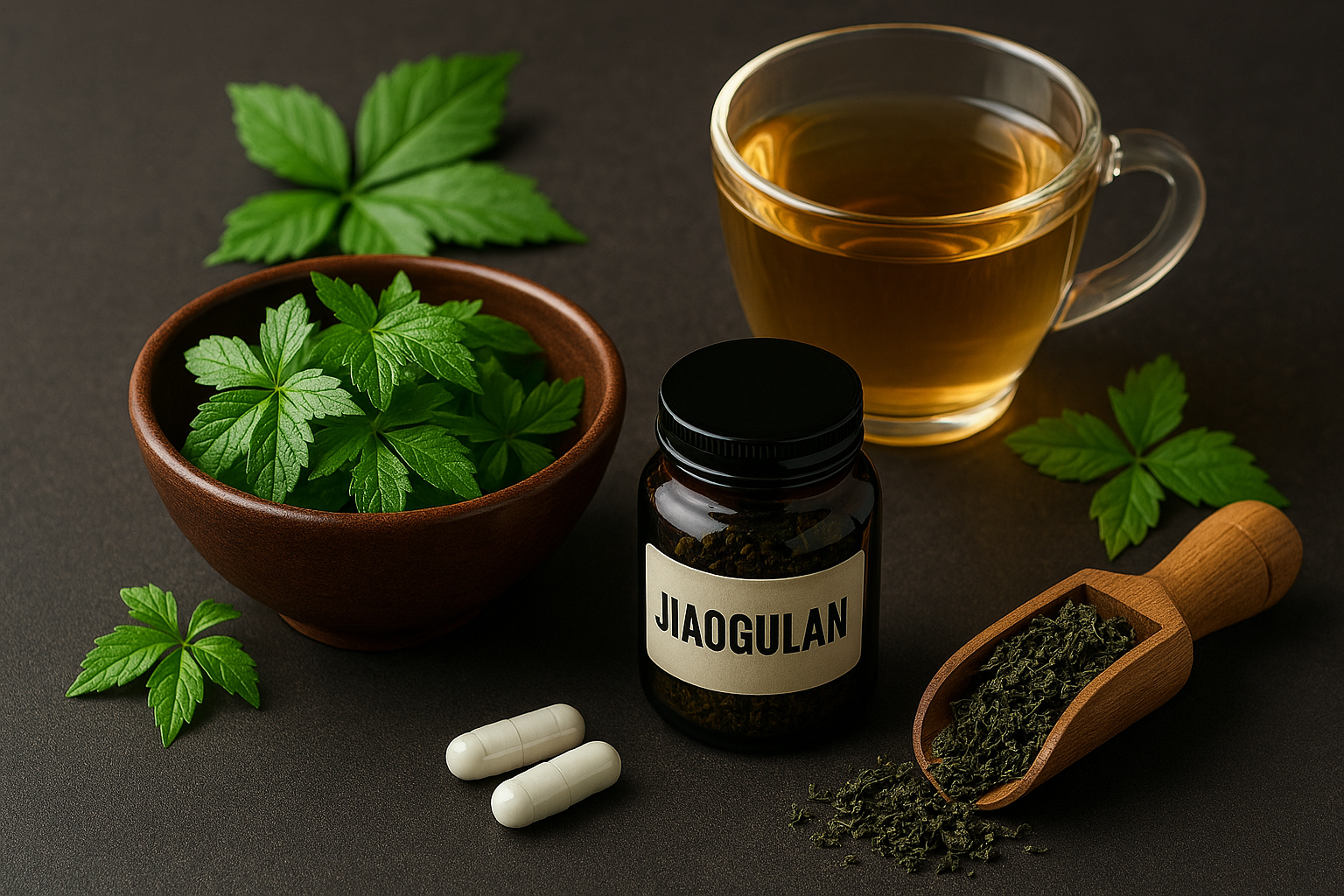Jiaogulan: The “Immortality Herb” Backed by Science
Jiaogulan (Gynostemma pentaphyllum) is a leafy vine native to southern China and Southeast Asia, long used in traditional herbal medicine. Often called the “immortality herb,” locals credit this tea for their longevity—particularly in regions where people commonly live past 100 and drink it daily.
But does it live up to the hype? Modern research is beginning to support what ancient traditions have long believed: this adaptogen may help with stress, metabolism, blood sugar, cholesterol, and more. Here’s what you need to know about this intriguing herb.
🌿 What Is Jiaogulan?
It’s part of the gourd family and grows as a climbing vine. Its leaves are usually dried and brewed as a tea, though capsules and powders are now widely available. Unlike ginseng (to which it’s often compared), it’s caffeine-free and has a slightly bittersweet, earthy taste.
What makes this plant stand out is its unusually high content of saponins—specifically gypenosides, which are chemically similar to the ginsenosides found in Panax ginseng. Some of these compounds are nearly identical, and this herb actually contains more of them than ginseng itself.
🧭 Traditional Use: A Tonic for Longevity
In China, this plant has been used for centuries as a natural tonic to promote energy, reduce fatigue, and support cardiovascular health. The people of Guizhou province, where it grows naturally, often refer to it as “miracle grass” or “southern ginseng.”
Though officially added to Traditional Chinese Medicine (TCM) more recently, folk remedies have long relied on it for respiratory issues, high cholesterol, stress, and general vitality.
🧪 Health Benefits: What the Science Says
🌱 1. Adaptogen for Stress Relief
This herb is classified as an adaptogen, which means it helps the body adapt to stress and rebalance itself. Studies suggest it may regulate cortisol levels and support mental clarity and mood—without the jittery side effects of caffeine.
One clinical trial found that the extract significantly reduced anxiety in individuals under chronic stress.
👉 Read the study on PubMed
🧠 Learn more about adaptogens on Healthline
💪 2. Supports Blood Sugar and Metabolism
Perhaps the strongest evidence lies in its effect on blood sugar and insulin sensitivity.
In several human trials, tea or extract significantly lowered fasting glucose levels and improved HbA1c readings in people with type 2 diabetes. This is thought to be due to activation of AMPK, an enzyme that boosts cellular energy and glucose uptake.
It’s also been shown to assist with weight loss. A 2022 study found that participants taking the extract saw more fat loss, especially around the abdomen, than those on placebo.
❤️ 3. Cardiovascular Support
Traditional use for heart health is backed by research showing it may:
- Lower LDL cholesterol and raise HDL
- Improve circulation
- Protect blood vessels with antioxidant effects
- Help reduce blood pressure
While large-scale trials are still needed, results are promising—especially for those with metabolic syndrome.
🛡 4. Antioxidant and Immune Boosting
This tea is rich in natural antioxidants like flavonoids and polysaccharides, which help neutralise free radicals and protect cells from damage.
It also shows potential in boosting immune function by supporting white blood cell activity. Some early research even suggests anti-cancer and neuroprotective effects, though more studies are needed in humans.
Like Ashwagandha, it’s part of a group of herbs that support balance and resilience.
💡 You might also like:
Vitamin D and immunity
Magnesium’s role in stress support
⚠️ Side Effects and Precautions
This herb is generally well tolerated, but keep in mind:
- May cause mild digestive upset (nausea, bloating) in some
- Not advised for pregnancy or breastfeeding
- Avoid if taking blood sugar meds or blood thinners
- Don’t use before surgery due to clotting effects
✅ Always consult your GP before starting any new herbal supplement.
👉 Safety information and traditional uses on WebMD
🍵 How to Use Jiaogulan
You can enjoy this herb in a few easy ways:
- As tea – Steep 1–2 tsp of dried leaves for 5–10 mins
- Capsules – Look for gypenoside-standardized extracts (450–800 mg daily)
- Powder – Blend into smoothies or juices for an earthy, green flavour
For best results, take daily for at least 4–8 weeks. It works gradually, with subtle improvements in energy, stress levels, and metabolic balance.
✅ Final Thoughts
This isn’t just herbal folklore—it’s a well-studied, honest-to-goodness adaptogen with real health potential. Whether you’re managing stress, supporting blood sugar, or just want a natural daily tonic, this time-tested plant could be worth exploring.
It’s safe, easy to use, and widely available. Just choose high-quality products, start slowly, and listen to your body.
💬 Coming soon: Our top Jiaogulan teas and capsules, reviewed and rated on NoBullHealthFoods.com.

👉 Like this article? Share it on Facebook 💬
➡️ Join our private Facebook group here! [Join Now]

Leave a Reply